By Jennie Rhodes and Paul Whitelock
Thursday 6 June 2024
The elections to the Europe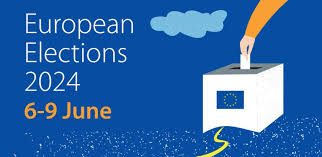 an Parliament start today, 6 June, and last until Sunday, 9 June, amid concerns that after the votes are counted, the Union may take a sharp step to the right. Extreme right-wing groups like the Alternative fur Deutschland (AfD) in Germany, VOX in Spain and the Partij voor de Vrijheid (PVV), Party for Freedom, in the Netherlands are just three examples.
an Parliament start today, 6 June, and last until Sunday, 9 June, amid concerns that after the votes are counted, the Union may take a sharp step to the right. Extreme right-wing groups like the Alternative fur Deutschland (AfD) in Germany, VOX in Spain and the Partij voor de Vrijheid (PVV), Party for Freedom, in the Netherlands are just three examples.
Backstory
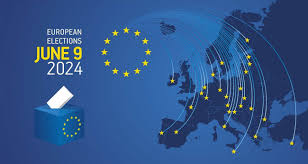 Foreign residents of the 27 member states of the EU may vote in European elections, as well as in local ones, but not in regional or national polls. This is out of order, in my opinion. We pay taxes in our country of residence, yet may not vote.
Foreign residents of the 27 member states of the EU may vote in European elections, as well as in local ones, but not in regional or national polls. This is out of order, in my opinion. We pay taxes in our country of residence, yet may not vote.
Since Brexit, surely the greatest folly known to man and proof that voters cannot be trusted to make sensible choices, British residents of EU countries may no longer vote in Euro elections. So, I say NO MORE PLEBISCITES! Why elect a government to represent you and then have referendums?
The only way for any non-EU resident from another country to vote in the general election of that EU member state, is to become a national of that country. In Spain, many have done just that since Brexit.
EU residents may either vote in the European elections in their home country or their new one.
Eligible to vote in Spain on Sunday
Suzanne Mastbroek is originally from the Netherlands but lived in Belgium for many years before moving to Málaga province three years ago.
She opted to vote in the Netherlands because she says: "As a resident in Spain I could also have voted here, just like last year for the municipal elections, but for now I know too little about Spanish politics to do that. Maybe next time."
Mario Blancke is originally from Belgium. He got involved in local politics in Málaga province as part of the “Save our Homes Axarquía” association to fight for the rights of owners of illegal houses.
He says he always votes "in honour of all the people who gave their lives for the right to vote."
Mario adds, "Looking back at all the problems we faced with the regional and national government, SOHA decided to fight, and we made the difference."
Helen Sijsling, a Dutch national who lives in Málaga, says that for her "it is important to vote for the EU for solutions to big problems like climate change that do not stop at a border ".
Helen explains, "My husband and I received two ways to vote, one from the Netherlands, as we are Dutch, and one from Spain as we live here."
The couple decided to vote in the Netherlands.
 Nolwenn Gaudin is originally from France and lives in Málaga. She decided to vote in Spain and says: "I had the choice to register for France or Spain and living here with very few voting rights, it's important to me to vote whenever possible."
Nolwenn Gaudin is originally from France and lives in Málaga. She decided to vote in Spain and says: "I had the choice to register for France or Spain and living here with very few voting rights, it's important to me to vote whenever possible."
She adds, "While the EU is not exactly the dream organisation that was described at its inception, many rights, subsidies and political decisions that better our everyday life do come from it.
“So it matters to me to vote for representatives that will defend my rights and opinions at the EU Parliament."
How to get a Euro vote
Any citizen of an European member state wishing to vote for the European Parliament in Spain should take an original ID document (no photocopies) which can be a national identity card, passport or driving licence along to a polling station on Sunday.
For more information visit: www.elections.europa.eu/en/how-to-vote/es/
Some have changed nationality
Lawrence Renaudon Smith has lived in Mallorca since 1993. After Brexit he decided it was time to apply for Spanish citizenship.
"Of course I will be voting in the European elections this time. The main thing for me about having Spanish nationality is that now I am once again living in Spain as my right, like I did as an EU citizen," he explains.
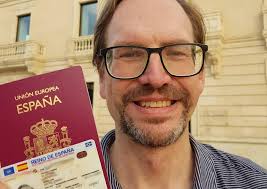 David Eldridge has lived in Mallorca since 2008. He says he started the process of applying for Spanish nationality in 2019.
David Eldridge has lived in Mallorca since 2008. He says he started the process of applying for Spanish nationality in 2019.
"Basically I didn't want my European citizenship taken away and had a way to avoid that."
"Voting is the main practical advantage, but others are slightly easier bureaucracy and much easier travel."
But he says the biggest advantage "is a psychological one. Once again, my passport reflects my European identity. Having lived in different countries including outside Europe, my number one identity is European."
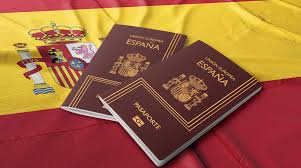 Adrian Stone Mills and Hannah Morrish Wilson have lived in Málaga province since 2002, where they own and run a small hotel. They say:
Adrian Stone Mills and Hannah Morrish Wilson have lived in Málaga province since 2002, where they own and run a small hotel. They say:
"In the years running up to Brexit we had reached our eligible years for taking out [Spanish] nationality and it was something we had discussed but never pursued. Brexit gave us the push we needed and in 2016, after the results were declared, we started the process for ourselves and our two children.
"Now as European citizens we will be able to vote in the upcoming European elections. We have our ballot papers at the ready, the research is done and we ready to go."
***
As for me, I’ve been contemplating doing this since Brexit. I did all the research, did a sample multiple-choice exam online (I got 98% correct), and then ..... I never pursued it.
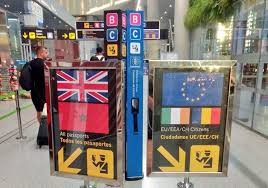 But now, I’m sick and tired of having to join the long “Outside the EU” queue at passport control, while my EU contemporaries just swan through the blue channel without hindrance.
But now, I’m sick and tired of having to join the long “Outside the EU” queue at passport control, while my EU contemporaries just swan through the blue channel without hindrance.
But most important for me is having the vote. As I’ve indicated, I can currently only vote in local elections. I want to vote in all elections and have my say in the country I chose to live in over 15 years ago.
So, I shall get my application in before the end of the month.
Photo: Euro Weekly News
© Jennie Rhodes and Paul Whitelock
Further reading:
Acquiring nationality - Residence - Citizens - Your rights and obligations in the EU - Tu espacio europeo - Punto de Acceso General (administracion.gob.es)
Why can’t we have the vote? - Secret Serrania de Ronda
Useful links:
www.elections.europa.eu/en/how-to-vote/es/
http://www.immigrationspain.es
Acknowledgements:
Adrian Stone Mills
David Eldridge
Euro Weekly News
Hannah Morrish Wilson
Helen Sijsling
Jennie Rhodes
Lawrence Renaudon Smith
Mario Blancke
Nolwenn Gaudin
Pablo de Ronda
SUR in English
Suzanne Mastbroek
www.proz.com
Tags:
Adrian Stone Mills, AfD, Alternative fur Deutschland, Belgium, Brexit, David Eldridge, driving licence, Dutch national, Election, Europe, European citizen, European election, EU, European Parliament, European Union, Euro Weekly News, France, general election, Germany, Hannah Morrish Wilson, Helen Sijsling, Jennie Rhodes, Lawrence Renaudon Smith, Málaga province, Mallorca, Mario Blancke, national identity card, Netherlands, Nolwenn Gaudin, non-EU resident, Pablo de Ronda, PVV, Partij voor de Vrijheid, Party for Freedom, passport, Paul Whitelock, “Save our Homes Axarquía”, Spain, Spanish citizenship, SUR in English, Suzanne Mastbroek, UK, vote, VOX, www.proz.com